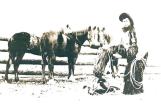1
The Chinese CowboyChinese cowboy Ernie Yet was a unique figure in British Columbia's history. Most Chinese immigrants became houseboys, cooks, railroad workers or vegetable farmers, but some discovered their passion for the cowboy life. Unfortunately, very little is known about Chinese immigrants who became ranchers or cowboys, but those who chose this rough profession seem to have performed exceptionally well. Ernie Yet was one of them.
Ernie's father was one of the 50,000 Chinese that came to the Cariboo goldfields looking for gold after the railway was built. He made a little in the fields, then moved to Cache Creek, B.C., and opened a general store. Ernie was born in Cache Creek in 1902. Shortly before his birth, the Spears family, who lived in a sod-roofed house in the Upper Hat Creek area, stopped at the general store with their newborn baby to buy supplies. They were on their way home from Ashcroft, where they had registered the birth, and Mrs. Yap was very excited about the baby that Mrs. Spears carried into the store. She asked what he had been named, which was Ernest Richard. Mrs. Yap liked the name so much that she said if she had a boy she would call him Ernie. Their Chinese surname was Kwan Yap, but - as it happened frequently in those days - Ernie's name was corrupted, first to "Yap's Boy", and then to "Yet".
When Ernie's father died, his mother sold the store, took out naturalization papers, and took over the Spears's quarter section homestead in the Upper Hat Creek area - a very unusual move for a Chinese widow. By the time she died in 1913, the family was running 400 head of cattle. Ernie was the foreman, a crack shot with a handgun, and the way he and his specially trained quarter horse worked the herd was said to have been "a thing of beauty".
2
Yet, ErnieCirca 1913
Upper Hat Creek Valley, British Columbia, Canada
 Credits:
Credits:City of Vancouver Archives
3
Ernie was an honest-to-goodness man whose English was totally unaccented, and nobody could tell from his speech that he was Chinese. He spoke three Chinese dialects perfectly, but could not write his own name in Chinese. The photograph of Ernie in full cowpoke regalia, with fur chaps, stetson hat, a rawhide rope or a bull whip, and wearing a handgun in a holster on his left side for a right-hand cross draw was taken in the early part of the 20th century at the family ranch. Although the Chinese were a minority, Ernie was well respected in the community and amongst other cowboys and ranchers. He was an excellent cowboy and horseman, and therefore his race did not matter - in this part of the country, men were men and could be accepted as such.Ernie got married in 1913, and moved to Vancouver in 1915. It was a difficult transition for the young cowboy. In the city, the Chinese were supposed to take the pushing around that went with being a minority, but Ernie Yet was never able to take it.
One of Ernie's friends from his ranching days, a former stagecoach driver, had become a senior officer of the Vancouver police force. When Ernie arrived, he applied to his old friend to become a policeman, but although he was a better shot and in much better shape than most of the department, he didn't have a chance. The Chinese weren't even allowed to vote in those days, which greatly bothered him. He had been born here and gone to Grade Nine in school; therefore he figured that voting would be automatic. As one of the relatively few Chinese who spoke perfect English, Ernie became an interpreter and associate of several lawyers. He also became an unofficial policeman for the Freemasons in the rough-tough period when Pender Street was often a battleground between rival tongs.
The city wasn't really the promised land for the young cowboy. He returned to the Cariboo for a brief fling at panning gold, which his father had done to raise the original stake for the general store. But that, too, had changed and the newcomers who populated the area were meanwhile just as bigoted as the city folk.
Ernie returned to Vancouver and helped his younger brother Arthur to operate a small trucking business. In 1929 he opened one of the first gas stations in Chinatown. Later he tried contract logging on Vancouver Island and became the unofficial spokesman at Wartime Prices and Trade Board sittings for the Chinese truckers and market gardeners, who faced extinction because of a shortage of tires and gas. His pleading kept most of them in business.
5
For a brief period, Ernie put his old ranching experience to work as a plowman in Steveston, then became a taxi dispatcher, but even in his sixties he still remembered the time when he was a cowboy on a Cariboo ranch. He would go up to the attic and get an old bull whip that he had hand-braided himself, take it out into his back yard on East Pender Street, and give it a good crack. The sound would echo through the neighbourhood like a gunshot, and Ernie would say with a grin "Just want to see if I could still do it".He was killed in Vancouver in 1966 by a juvenile delinquent.
Source: Wasserman, Jack. "Vancouver Sun", April 1966.
